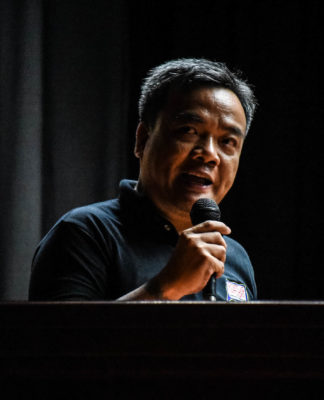POPE JOHN Paul II canonized four Italians and a Lebanese in a solemn ceremony in celebration of Trinity Sunday last June 10, as he set a record of 451 canonizations in his 23-year pontificate.
The Holy Father granted sainthood to Blesseds Luigi Scrosoppi, Agostino Roscelli, Bernardo da Corleone, Teresa Eustochio Verzeri, and Rafqa Petra Choboq Ar-Rayes, Lebanon’s first native saint, at the St. Peter’s Square in front of 30,000 faithful – 10,000 of them from Lebanon.
In his homily, the Holy Father said that in this “true feast of holiness,” the people of God saw “that the Lord does not cease to donate to his Church and to the world admirable examples of men and women in which his Trinitarian glory is reflected”.
“These witnesses,” he said, “must encourage us to long for Heaven and untiringly search the Kingdom of God and his justice.”
The Pope paid tribute to Scrosoppi (1804-1884), the 19th-century Italian priest of the Oratory of St. Philip Neri, known for his kindness and zeal. Beatified in 1981, he was believed to be responsible for the miraculous cure of Peter Changu Shitima, a 27-year-old Zambian and a seminarian from the same religious order, who was in the terminal stages of AIDS when he was healed in 1996. Shitima was in the crowd that Sunday.
Roscelli (1818-1902), an Italian priest, founded the Congregation of the Sisters of the Immaculate Conception of the Blessed Virgin Mary. St. Agostino’s “indivisible love for God and his brethren constitutes the fundamental and identifying line of his spirituality,” the Pope said.
The Pope described St. Bernardo da Corleone (1605-1687) of Sicily, a repentant killer who entered the Capuchin order, as the “image of the present day saint,” while St. Theresa Verzeri as “(the) one who learned from the Heart of Jesus.” Verzeri founded the Institute of Daughters of the Sacred Heart of Jesus.
The Pope also held out the Lebanese martyr as a symbol of peace in a troubled Middle East.
“In the Middle East, devastated by many bloody conflicts and by many unjust sufferings, the witness of Ar-Rayes, a Lebanese religious, remains a source of faith for all those subjected to many trials,” the Holy Father said.
“May the sick, the afflicted, the war refugees and all the victims of the hatred of today and yesterday, find in St. Rafqa a travelling companion in order that, through her intercession, they continue to seek in obscure reasons to continue to hope and to build peace!” Alder T. Almo

















